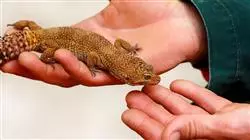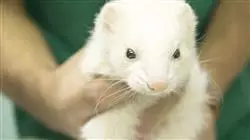University certificate
The world's largest faculty of veterinary medicine”
Introduction to the Program
This training is the best option you can find to specialize in Dermatology in Small Animals and make more accurate diagnoses”

Dermatology is possibly the most frequently encountered specialty within pet veterinary medicine in daily clinical practise.
Because of this, and taking into account its importance, the program of this Postgraduate certificate has been developed by a highly-regarded veterinary teaching team in Veterinary Dermatology..
The combination of experience, both theoretical and practical, allows the veterinary professional to develop, first hand, specialized knowledge to carry out a good diagnosis and treatment of dermatological diseases from the theoretical point of view, with the latest developments and scientific advances and from the extensive practical experience of all teachers. The combination of a great team of interrelated teachers is what makes this Postgraduate certificate unique among all those offered in similar courses.
The topics developed in this Postgraduate certificate program address, in-depth, the most important small animal dermatoses, including dogs, cats and other non-traditional pets.
With this Postgraduate certificate veterinary professionals acquire advanced knowledge of Veterinary Dermatology for daily clinical practice. The study system applied by this university provides a solid foundation in the specialized knowledge of the Physiopathology of the skin and latest generation dermatological therapeutics.
As it is an online Postgraduate certificate, students are not conditioned by fixed schedules, nor do they need to commute to another location. All of the content can be accessed at any time of the day, so you can balance your working or personal life with your academic life.
Don't miss the opportunity to study this Postgraduate certificate with us. It's the perfect opportunity to advance your career and stand out in an industry with high demand for professionals”
This Postgraduate certificate in Dermatology in Non-Traditional Animals contains the most complete and up-to-date scientific program on the market. The most important features include:
- The development of case studies presented by Small Animal Dermatology experts
- The graphic, schematic, and practical contents with which they are created, provide scientific and practical information on the disciplines that are essential for professional practice
- Breakthroughs in Dermatology in Small Animals
- Practical exercises where the self-assessment process can be carried out to improve learning
- Special emphasis on innovative methodologies in Dermatology in Small Animals
- Theoretical lessons, questions to the expert, debate forums on controversial topics, and individual reflection assignments
- Content that is accessible from any fixed or portable device with an Internet connection
This Postgraduate certificate is the best investment you can make when choosing a refresher programme to update your existing knowledge of Veterinary Dermatology"
The multimedia content, developed with the latest educational technology, will provide the professional with situated and contextual learning, i.e., a simulated environment that will provide immersive education programmed to learn in real situations.
This program is designed around Problem-Based Learning, whereby the professional must try to solve the different professional practice situations that arise throughout the program. For this purpose, the professional will be assisted by an innovative interactive video system created by renowned and experienced experts in Dermatology in Small Animals and with extensive experience.
This training comes with the best didactic material, providing you with a contextual approach that will facilitate your learning"

This 100% online course will allow you to combine your studies with your professional work while expanding your knowledge in this field"
Why study at TECH?
TECH is the world’s largest online university. With an impressive catalog of more than 14,000 university programs available in 11 languages, it is positioned as a leader in employability, with a 99% job placement rate. In addition, it relies on an enormous faculty of more than 6,000 professors of the highest international renown.

Study at the world's largest online university and guarantee your professional success. The future starts at TECH”
The world’s best online university according to FORBES
The prestigious Forbes magazine, specialized in business and finance, has highlighted TECH as “the world's best online university” This is what they have recently stated in an article in their digital edition in which they echo the success story of this institution, “thanks to the academic offer it provides, the selection of its teaching staff, and an innovative learning method aimed at educating the professionals of the future”
A revolutionary study method, a cutting-edge faculty and a practical focus: the key to TECH's success.
The most complete study plans on the university scene
TECH offers the most complete study plans on the university scene, with syllabuses that cover fundamental concepts and, at the same time, the main scientific advances in their specific scientific areas. In addition, these programs are continuously being updated to guarantee students the academic vanguard and the most in-demand professional skills. In this way, the university's qualifications provide its graduates with a significant advantage to propel their careers to success.
TECH offers the most comprehensive and intensive study plans on the current university scene.
A world-class teaching staff
TECH's teaching staff is made up of more than 6,000 professors with the highest international recognition. Professors, researchers and top executives of multinational companies, including Isaiah Covington, performance coach of the Boston Celtics; Magda Romanska, principal investigator at Harvard MetaLAB; Ignacio Wistumba, chairman of the department of translational molecular pathology at MD Anderson Cancer Center; and D.W. Pine, creative director of TIME magazine, among others.
Internationally renowned experts, specialized in different branches of Health, Technology, Communication and Business, form part of the TECH faculty.
A unique learning method
TECH is the first university to use Relearning in all its programs. It is the best online learning methodology, accredited with international teaching quality certifications, provided by prestigious educational agencies. In addition, this disruptive educational model is complemented with the “Case Method”, thereby setting up a unique online teaching strategy. Innovative teaching resources are also implemented, including detailed videos, infographics and interactive summaries.
TECH combines Relearning and the Case Method in all its university programs to guarantee excellent theoretical and practical learning, studying whenever and wherever you want.
The world's largest online university
TECH is the world’s largest online university. We are the largest educational institution, with the best and widest online educational catalog, one hundred percent online and covering the vast majority of areas of knowledge. We offer a large selection of our own degrees and accredited online undergraduate and postgraduate degrees. In total, more than 14,000 university degrees, in eleven different languages, make us the largest educational largest in the world.
TECH has the world's most extensive catalog of academic and official programs, available in more than 11 languages.
Google Premier Partner
The American technology giant has awarded TECH the Google Google Premier Partner badge. This award, which is only available to 3% of the world's companies, highlights the efficient, flexible and tailored experience that this university provides to students. The recognition as a Google Premier Partner not only accredits the maximum rigor, performance and investment in TECH's digital infrastructures, but also places this university as one of the world's leading technology companies.
Google has positioned TECH in the top 3% of the world's most important technology companies by awarding it its Google Premier Partner badge.
The official online university of the NBA
TECH is the official online university of the NBA. Thanks to our agreement with the biggest league in basketball, we offer our students exclusive university programs, as well as a wide variety of educational resources focused on the business of the league and other areas of the sports industry. Each program is made up of a uniquely designed syllabus and features exceptional guest hosts: professionals with a distinguished sports background who will offer their expertise on the most relevant topics.
TECH has been selected by the NBA, the world's top basketball league, as its official online university.
The top-rated university by its students
Students have positioned TECH as the world's top-rated university on the main review websites, with a highest rating of 4.9 out of 5, obtained from more than 1,000 reviews. These results consolidate TECH as the benchmark university institution at an international level, reflecting the excellence and positive impact of its educational model.” reflecting the excellence and positive impact of its educational model.”
TECH is the world’s top-rated university by its students.
Leaders in employability
TECH has managed to become the leading university in employability. 99% of its students obtain jobs in the academic field they have studied, within one year of completing any of the university's programs. A similar number achieve immediate career enhancement. All this thanks to a study methodology that bases its effectiveness on the acquisition of practical skills, which are absolutely necessary for professional development.
99% of TECH graduates find a job within a year of completing their studies.
Postgraduate Certificate in Dermatology in Non-Traditional Animals
Dive into the fascinating world of dermatology in non-traditional animals with our Postgraduate Certificate in Dermatology in Non-Traditional Animals from TECH Global University. If you have a passion for exotic animals and want to specialize in their dermatological health care, this academic program is perfect for you.
Our online classes give you the flexibility to study from anywhere, anytime. Through our interactive virtual platform, you'll have access to high-quality content, specialized lectures, and learning resources designed specifically for non-traditional animal dermatology.
Why study with us?
In addition to the convenience of online classes, our program stands out for its practical and clinically application-oriented approach. Our team of expert faculty will guide you through the latest advances in the diagnosis and treatment of dermatologic diseases in exotic animals, providing you with the skills and knowledge necessary to deliver quality care to these special patients.
Our program will provide you with access to up-to-date content and interactive resources that will help you gain an in-depth understanding of the dermatologic peculiarities of non-traditional animals. In addition, you will have the support of our expert faculty, who will guide you through the learning process and answer your questions and doubts in real time.
At TECH Global University, we pride ourselves in offering academic programs of excellence that adapt to the changing needs of the veterinary field. Our Postgraduate Certificate in Dermatology in Non-Traditional Animals will provide you with the tools you need to become a highly skilled professional in this exciting field and open up new career opportunities.
Don't miss the opportunity to expand your knowledge in veterinary dermatology and make a difference in the health of exotic animals. Enroll today in our Postgraduate Certificate in Dermatology in Non-Traditional Animals and become a specialist in the dermatological care of these fascinating living creatures!







